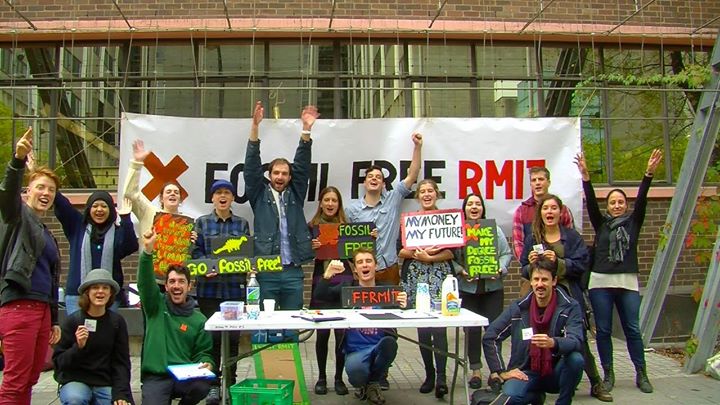PETITION: Divest RMIT from fossil fuels
Vice Chancellor Mr Martin Bean & Chief Financial Officer Kate Koch

- Publicly commit to cease any further investment in fossil fuels
- Publicly commit to divesting RMIT entirely from fossil fuels within the next two years
- Publicly report regularly on the fossil fuel exposure and carbon intensity of RMIT's investments
The risks of catastrophic climate change are well documented: increased natural disasters like bushfires and cyclones; rising sea levels; acidification of the oceans; severe drought and crop failure resulting in food and water shortages; mass displacement of populations and destruction of coastal cities.
Climate change scientists have told us that to avoid the worst effects we need to keep warming below 2 degrees Celsius. There is a limit to the amount of carbon we can emit to stay below this target (the ‘Carbon Budget’).
This amount is, according to the IPCC Assessment Report, 575 gigatons between 2011 and 2049. The fossil fuel companies have a total of 2,795 gigatons of carbon claimed in reserve, as revealed by the Carbon Tracker Initiative in 2011. This is 5 times our total Carbon Budget. These companies, if left unchecked, will drive the planet into radical climate destabilisation in pursuit of profit before the end of the century. A recent study by the University College of London confirms Carbon Tracker’s findings, and shows that Australia needs to keep 90% of its coal reserves in the ground to limit global warming to 2 degrees. It is clear that investment in companies fuelling the problem is unacceptable in the 21st century.
An opportunity and a responsibility to become a sustainability leader
We see divestment as an opportunity for RMIT to become a sustainability leader, the definition of a forward-thinking institution that truly cares about the future of its students. We also see it as a responsibility. Our responsibility to lobby the administration and do whatever we can to fight climate change, but also your responsibility, Ms Koch, to take the bold action that is required.
We cannot expect RMIT’s external fund managers to make these changes without your guidance. They are committed to business as usual: to profit motive, to working with and investing in the industries that are warming our atmosphere. Clear and direct actions are required to shift RMIT’s investments out of dirty industries and into the low emission and clean energy sectors. This has to come from the highest levels of the university administration. It has to come from you and your colleagues.
Sponsored by
To:
Vice Chancellor Mr Martin Bean & Chief Financial Officer Kate Koch
From:
[Your Name]
We call on RMIT to do the following:
Publicly commit to cease any further investment in fossil fuels
Publicly commit to divesting RMIT entirely from fossil fuels within the next two years
Publicly report regularly on the fossil fuel exposure and carbon intensity of RMIT's investments
The risks of catastrophic climate change are well documented: increased natural disasters like bushfires and cyclones; rising sea levels; acidification of the oceans; severe drought and crop failure resulting in food and water shortages; mass displacement of populations and destruction of coastal cities.
Climate change scientists have told us that to avoid the worst effects we need to keep warming below 2 degrees Celsius. There is a limit to the amount of carbon we can emit to stay below this target (the ‘Carbon Budget’).
This amount is, according to the IPCC Assessment Report, 575 gigatons between 2011 and 2049. The fossil fuel companies have a total of 2,795 gigatons of carbon claimed in reserve, as revealed by the Carbon Tracker Initiative in 2011. This is 5 times our total Carbon Budget. These companies, if left unchecked, will drive the planet into radical climate destabilisation in pursuit of profit before the end of the century. A recent study by the University College of London confirms Carbon Tracker’s findings, and shows that Australia needs to keep 90% of its coal reserves in the ground to limit global warming to 2 degrees. It is clear that investment in companies fuelling the problem is unacceptable in the 21st century.
An opportunity and a responsibility to become a sustainability leader
We see divestment as an opportunity for RMIT to become a sustainability leader, the definition of a forward-thinking institution that truly cares about the future of its students. We also see it as a responsibility. Our responsibility to lobby the administration and do whatever we can to fight climate change, but also your responsibility, Mr Somogyi, to take the bold action that is required.
We cannot expect RMIT’s external fund managers to make these changes without your guidance. They are committed to business as usual: to profit motive, to working with and investing in the industries that are warming our atmosphere. Clear and direct actions are required to shift RMIT’s investments out of dirty industries and into the low emission and clean energy sectors. This has to come from the highest levels of the university administration. It has to come from you and your colleagues.
